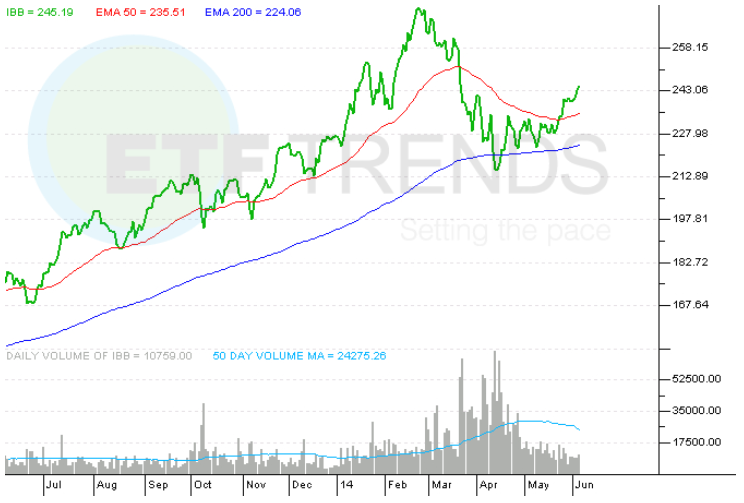A Stable ETF to Gain Exposure to a Volatile Biotech Sector
After biotech stocks tumbled in the wake of drug pricing concerns and a disdain for growth stocks, biotechnology exchange traded funds show cheaper valuations and possibly present a buying opportunity for investors.
“The recent price pressure may present a buying opportunity for investors interested in biotech firms,” according to Robert Goldsborough, fund analyst for Morningstar.
For instance, investors can look at broad biotech ETFs, like the iShares Nasdaq Biotechnology ETF (IBB) , which tracks an index of 122 biotech names listed on the Nasdaq weighted by market capitalization. Along with big name firms like Gilead Sciences (GILD), Celgene (CELG), Amgen (AMGN) and Biogen (BIIB), The iShares Biotech ETF allocates about 20% of its portfolio to smaller companies that are developing specialized drugs for targeted diseases. IBB comes with a 0.48% expense ratio. [Technical Analysts See Bullish Signs for Biotech ETFs]
“The jarring pace of change, single-product liability, regulatory uncertainties, and intellectual property rights make picking stocks in the biotech sector a high-risk/high-reward proposition,” Goldsborough added. “As such, we think investing in the industry via an ETF makes a lot of sense; it’s a low-cost way to gain diverse exposure with one trade.”
Some investors, though, may want to focus on smaller companies and bet on innovative breakthroughs. The SPDR S&P Biotech ETF (XBI) tracks a more equally weighted index of biotech names, with its largest holding at 2.7% of the portfolio. The SPDR Biotech ETF includes a 25.3% weight toward small-caps and 47.7% in micro-caps. XBI has a 0.35% expense ratio. [More Upside Possible for Biotech ETF]
However, the market-cap weighted methodology has proved to be less volatile over the long run.
“IBB has been less volatile during the past five years than any other biotech ETF and has been less volatile than all but one actively managed biotech mutual fund,” Goldsborough said. “A cap-weighted strategy has resulted in better risk-adjusted returns across one-, three-, five-, and 10-year time periods.”
iShares Nasdaq Biotechnology ETF
For more information on the biotech sector, visit our biotechnology category.
Max Chen contributed to this article.
The opinions and forecasts expressed herein are solely those of Tom Lydon, and may not actually come to pass. Information on this site should not be used or construed as an offer to sell, a solicitation of an offer to buy, or a recommendation for any product.

